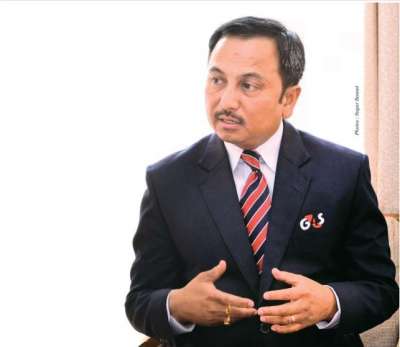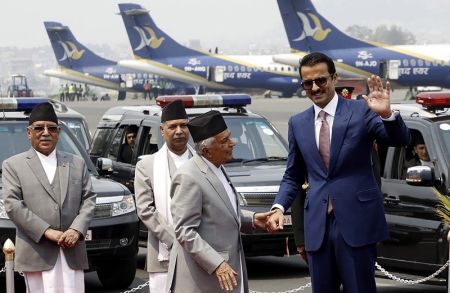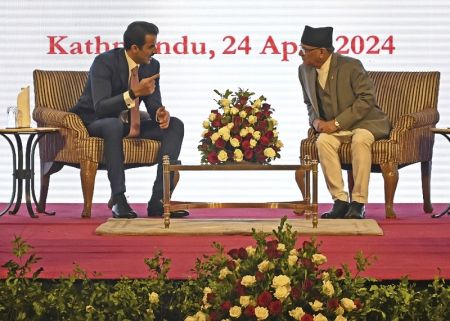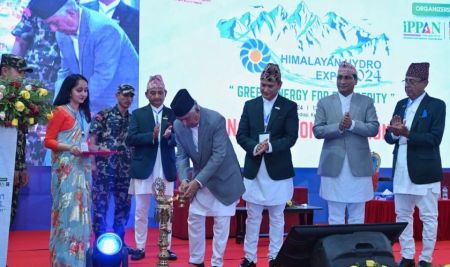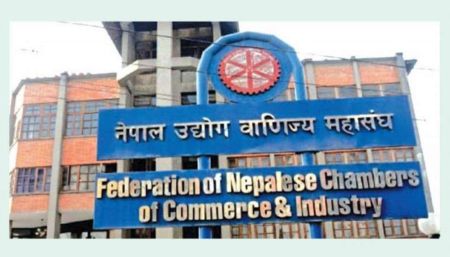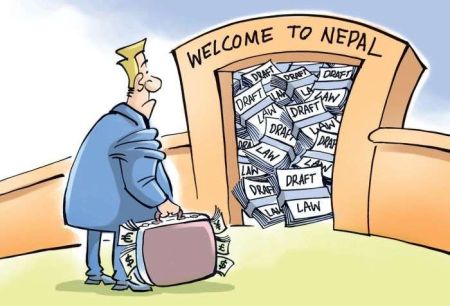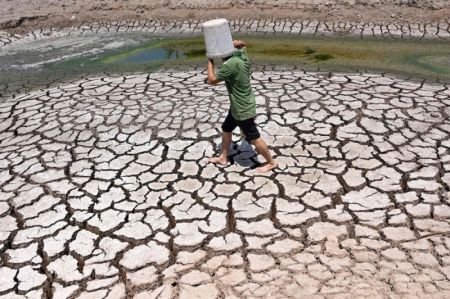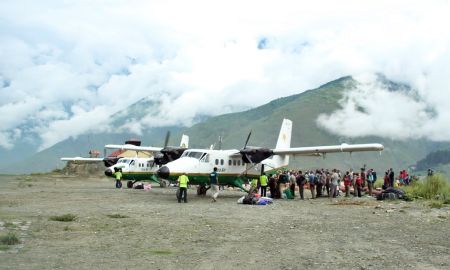The Taxpayers Of This Country Are The Major Donors To Nepal (july 2011)
.jpg) Dr Thomas Gass is the first residential Ambassador of Switzerland to Nepal. He was previously Switzerland's ambassador to the United Nations in New York and spent five years there prior to arriving in Nepal. He holds a PhD in biology and began his career with the Swiss Agency for Development and Cooperation (SDC) in 1988. He has held positions in the Swiss civil service and with the United Nations. Gass was the Vice-President of the executive board of the United Nations Development Programme and United Nations Population Fund. He has also lived in Guyana and worked in Africa and the former Soviet Union. In an interview with Pinaki Roy of New Business Age, Gass discussed a diverse range of issues from Swiss cooperation and its impact on the Nepali society to the constitution writing process in Nepal. Excerpts:
Dr Thomas Gass is the first residential Ambassador of Switzerland to Nepal. He was previously Switzerland's ambassador to the United Nations in New York and spent five years there prior to arriving in Nepal. He holds a PhD in biology and began his career with the Swiss Agency for Development and Cooperation (SDC) in 1988. He has held positions in the Swiss civil service and with the United Nations. Gass was the Vice-President of the executive board of the United Nations Development Programme and United Nations Population Fund. He has also lived in Guyana and worked in Africa and the former Soviet Union. In an interview with Pinaki Roy of New Business Age, Gass discussed a diverse range of issues from Swiss cooperation and its impact on the Nepali society to the constitution writing process in Nepal. Excerpts: Switzerland is among the few countries that initiated financial assistance to Nepal since 1959. How do you evaluate Swiss cooperation over the last 52 years?
I would say that this has been an extremely fruitful partnership that has encompassed mutual learning and has evolved over the time as any working partnership should. Initially, Switzerland implemented many projects directly and we had up to 100 experts working here at a time in the 1970s. We work differently today as we place more emphasis on the leadership and the coordination of the government and make use of national capacities for our projects here. We work through the ministries, INGOs and the local NGOs among others.
One of your primary objectives has been to build rural infrastructure, particularly, the suspension bridges. Do you systematically assess the economic impact of these bridges constructed mainly by Swiss support?
Yes, we do systematically assess the impact of our projects. But we don't assess these projects only in an economic way; we also look at them from a social and inclusion point of view. Over 1,600 trail bridges have been built and 3,500 maintained in the last 10 years. As a result, over 4.8 million people have better access to services through safer river crossings. On an average, each bridge has reduced walking distance by 2.5 hours and about 4 million person-days of employment have been generated through these bridges. These bridges are turnkey projects constructed by the villagers and the community. In the last four years alone, school attendance has risen by 22-27 per cent and visits to health centres have increased by 20 per cent on an average in places close to the newly built bridges. So, these are the kind of evaluations that we have.
Forestry is a major area that you have been contributing to. However, the Swiss government has diverted its attention from forestry to other areas of late. What could be the possible reasons for this?
We certainly have invested a great deal of time and resources in forestry and it's true that we have been focusing on some other areas too. However, let me correct you by saying that we are still interested in forestry. We are and will continue to invest in forestry. To give you the figures, we have been supporting the previously-funded forest project since 1991 which will end this year. The project has resulted in reversed deforestation for 185,000 hectares of government-managed forests. It has also improved the condition for 135,000 hectares of community-managed forests in the three districts where SDC [Swiss Development Corporation] has been active. Additionally, increased availability of forest products has contributed to sustainable livelihood of 145,000 families and 16,000 person-days of forest based employment have been generated for the poor. Strong multi-stakeholders mechanism and participation from empowered community groups were crucial while achieving these results.
We are currently planning and preparing a multi-stakeholder forest programme together with DFID and Finland with the Ministry of Forest and Soil Conservation in a supporting and facilitating role. It will build on our respective experiences and extend its impact to a great number of districts spanning over 10 years. The programme will cover about 60-65 districts of the total 75 districts in Nepal. Therefore, I would say that our presence in the forestry sector is probably more than ever.
You have tried to link Swiss contribution with entrepreneurship, for example, the employment fund. As a drastic departure, you have chosen to work with private companies as trainers. How successful has the idea been?
We have been engaged in vocational skill training since the 1950s with cheese and carpet production. We then moved into more formal vocational training with technical schools such as the one in Balaju. We were also associated with the Technical School in Jiri in the 1980s and the Training Institute for Technical Instruction (TITI) in the 1990s.
This cooperation changed over the time because many more national capacities were becoming available in the formal training sector. At the same time, we realised that we were reaching only a small number of trainees through formal training who could perhaps afford on their own. We started partnering with private entities as training providers to reach the poorer segment of the society as well. It is easier to target disadvantaged and marginalised groups through our new approach. The onus is now on the training provider to find the first employment for the trainees. We feel that vocational training responds more directly to the needs of the labour market through this approach.
The Swiss government was supporting the promotion of good governance. Do you think it has contributed towards transformation of government practices in Nepal?
The money that Switzerland invests into its development cooperation with Nepal comes from the Swiss tax payers. It is therefore absolutely essential that we give adequate attention to good governance and fiduciary management of the projects funded by us. And, we hope that it has a positive influence on the communities and the ministries we work with. Like any other country, Nepal requires good governance across the board from the villages to the central government and from the local associations to the major national parties. Our influence is obviously less at these levels. It is the Nepali people that have to hold their politicians and administration accountable for their respective actions.
On our part, we have promoted and tried to practise public hearings and public accountability for our projects at the local and district levels. We have seen that there are concerns to begin with while we practise accountability. However, all parties are satisfied after the entire exercise is over. The local and district administrations also realise that such practices actually strengthen their credibility. At the same time, the population too gains a lot of confidence.
You have been working with the same partner, Pro Public, for over 15 years now. How do you justify this association for such a long period of time?
Yes, we have had a very long cooperation for sure. But one has to acknowledge that Pro Public has a great deal of experience. They have been in the field for a long time and have been in many places so we have to give them credit for that. The current phase of the project with Pro Public is coming to an end this year and we haven't yet decided who will be our future partner. We believe that we need support from an independent organisation that helps the public hand to build up its credibility through public hearing. It does not necessarily have to be advocacy or accusing the administration on its weak points. It is more about building the capacity and confidence to face the public by being transparent. There is a niche for these kinds of activities in every district which makes our projects and the work of the local administration so much more effective.
Some of your projects like Jiri Multi-Purpose Development Project have been completely abandoned. What should Nepal do to make such projects and development sustainable?
Well, the question is not about what should Nepal do. It's rather about what should the development partners both Nepali and Foreign do. First, the projects have to respond to a real need in order to be sustainable. They need to respond to the demand by the beneficiaries and these needs may evolve over a period of time because the beneficiaries and their aspirations evolve. Second, the projects also have to be of appropriate size and be constantly adaptive. It is because the counterparts the national entities can take over some of the responsibilities of the projects in a more convincing way. Therefore, these are the two elements that help projects become sustainable. The projects are the tools to deliver certain services that need to continue.
The issue of inclusion is in the forefront of development debate lately. Is this the right approach given that it would further consolidate caste as ethnic identity just to get the desired benefits?
.jpg)
The benefits of social and economic development frequently do not get distributed equitably in societies that are very diverse and strongly compartmentalised. This leads to frustration and conflict. Invariably, there is an accumulation of wealth and power by those who already have it rather by the ones who don't have it. This has been experienced in many countries and it has been experienced in Nepal too. The other problem is that the potential of the diversity of a nation is not unleashed. Imagine a family, village or a country where all the decisions are taken only by men. For example, I can't imagine not involving my wife in decision making. She may have many skills, knowledge and competencies that I lack. The same is true for a country where a single ethnic or linguistic community is controlling all the decisions. This way, you are invariably reducing the development potential of your country to a fraction of what it could be otherwise.
Given the climate change, how do you think issues like bio-diversity can be addressed?
The problem with climate change is that we don't really know the end effect especially in a country like Nepal where there are so many ecological zones. Some places might become drier and others wetter so there could be a lot of fluctuation. The diversity in nature is the insurance policy against change. That's why nature has been created the way it is, with a lot of diversity where one plant may die and another may survive. The diversity has to be maintained in order to adapt to the changes that we don't know about. And therefore, natural bio-diversity and agricultural bio-diversity have to be promoted very actively keeping the climate change in mind. Farmers in Nepal who live in very diverse environments can help maintain and cultivate agricultural bio-diversity that would help the country resist and be more resilient to climate change and its effects. But the community and the country as a whole has to recognise that service. It's not just the food production, it goes beyond that. This is a little complicated it means that you have to start thinking about environmental services by getting the farmers some kind of support that is more than just the minimum payment.
The Swiss government is the major donor towards supporting constitution writing process but it doesn't seem to have yielded any results. What do you think is the problem with constitution writing in Nepal?
The taxpayers of this country are the major donors to Nepal. They are the ones who pay the salaries of the parliamentarians and indirectly, the politicians. Therefore, the investment of the international community cannot be compared with the investment of the people of this country in terms of time and resources. Changing the direction and design of a country takes time. It requires a lot of focus and motivation and the need to make compromises. This is in the hands of the Nepali politicians who have to come together for an agreement and then be able to share their findings with the general population at large to achieve a consensus. The current generation of the politicians owe this to the country. The constitution in my country also took a long time. We can be here as friends, nudging and criticising but in a constructive and positive way. We certainly hope that the constitution writing process in Nepal will now move forward.
Many people think that Swiss federalism model is appropriate for Nepal. How do you view this idea?
I strongly believe that Nepal needs to find its own model. What I can say though is that Swiss federalism is not about autonomy and independence. It is about how our cantons (provinces in your case) can work together building on reciprocal strengths and diversity to work in a united way for a stronger country. That requires a lot of compromises. One can never see one's own problems only. The provinces in my country need each other and I assume that it would be the same in Nepal. The policy makers can have a positive bias towards their own provinces. Previously, anyone who had a vision and was ambitious for Nepal focused on Kathmandu.
In the future, the people would like to be identified by their respective regions and will be looking for strengths and resource development of their own provinces. The sense of pride for belonging to a certain province will come into play which was not there earlier. It helps but you can never lose out of perspective that a province is not viable by itself and requires to be complemented by other provinces. Therefore, everyone needs to understand that Nepal, as a single entity, needs to establish credibility at the international level.


